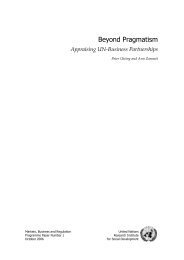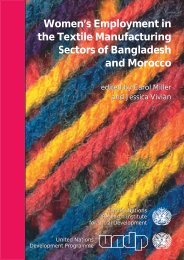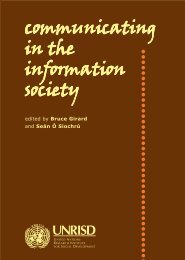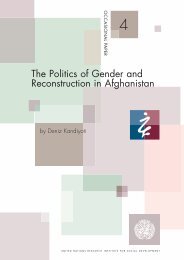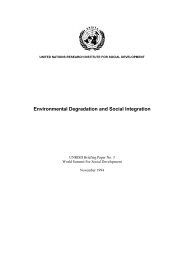RESEARCH REPORT 4 Paid Care Workers in Tanzania:
RESEARCH REPORT 4 Paid Care Workers in Tanzania:
RESEARCH REPORT 4 Paid Care Workers in Tanzania:
You also want an ePaper? Increase the reach of your titles
YUMPU automatically turns print PDFs into web optimized ePapers that Google loves.
Conclusions<br />
The government has not facilitated f<strong>in</strong>ancial and human resources to support the HBC<br />
program particularly the home-based care services of PLWHAs. This implies that the<br />
<strong>in</strong>tention of ensur<strong>in</strong>g access to health care for all as spelt out <strong>in</strong> the HBC guidel<strong>in</strong>es is far<br />
from be<strong>in</strong>g realized. The extent of HBC needs for PLWHAS have not yet been determ<strong>in</strong>ed<br />
because tools to assess such needs have not been put <strong>in</strong> place. The non-household care<br />
services for PLWHAs are essentially carried out by a few civil society organizations which<br />
rely heavily upon donor fund<strong>in</strong>g and the labour of volunteers who <strong>in</strong> the majority of cases are<br />
women. This dependency on external fund<strong>in</strong>g and volunteer labour threatens the susta<strong>in</strong>ability<br />
of the HBC programme <strong>in</strong> its current form. The volunteers <strong>in</strong>clude retired nurses, PLWHAs<br />
and poor women and very few men, all of whom end up subsidiz<strong>in</strong>g the cost of care for<br />
PLWHAs. And yet, most district councils do not have capacity to utilise the AIDS money<br />
allocated to them.<br />
The health facilities which have HBC programme components, both public and private<br />
<strong>in</strong>clud<strong>in</strong>g faith-based <strong>in</strong>stitutions, heavily rely upon the services of nurses as counsellors,<br />
supervisors of volunteers and tra<strong>in</strong>ers of non-health HBC providers. This implies putt<strong>in</strong>g<br />
additional stress on an already overworked nurs<strong>in</strong>g cadre. With<strong>in</strong> the health workforce, the<br />
nurs<strong>in</strong>g cadre (the majority of whom are women) seem to carry a disproportionate burden of<br />
care without adequate compensation. Those work<strong>in</strong>g <strong>in</strong> a health facility are for <strong>in</strong>stance<br />
subjected to risk-related conditions as they are not provided with proper protective gear when<br />
attend<strong>in</strong>g PLWHAs <strong>in</strong>clud<strong>in</strong>g those who are term<strong>in</strong>ally sick. . The monthly transport<br />
allowances for nurses who jo<strong>in</strong> the HBC as supervisors of home-based care is not sufficient to<br />
cover all the needed follow-up visits. They are also forced to part with their own money to<br />
pay for transport or to support the PLWHAs who are <strong>in</strong> desperate conditions. The bottom l<strong>in</strong>e<br />
is that the HBC programme is a burden to the households and to the few who are either<br />
work<strong>in</strong>g <strong>in</strong> HBC programmes as paid employees, or those who have volunteered to support<br />
these care services.<br />
16






